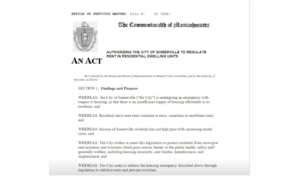Photo by Marc A. Hermann
While facing questions about the fate of small businesses, the Board postponed the vote to mid-January
(Somerville Wire) – The City of Somerville’s Board of Health met to discuss a proof of vaccine policy for certain businesses on Dec. 21 but decided to push the vote to Jan. 14. While outgoing Mayor Joe Curtatone and newly sworn in Mayor Katjana Ballantyne have expressed support for the policy, which has been in step with Boston Mayor Michelle Wu’s “B Together” initiative, many questions were raised by community members at the Dec. 21 meeting. While the City’s Director of Health and Human Services Doug Kress said that he is not able to disclose whether these concerns will impact or change the document at all, he said that he is hopeful of what may happen when the Board of Health reconvenes.
“We want to be able to protect our residents. That’s number one. … As we have seen, the place where a lot of people are becoming infected are obviously in places where there are indoor gatherings, especially where they’re taking off their masks or not wearing their masks,” said Kress. He added, “When we look at this as a whole, if we can do this as a regional approach and be consistent across the region, it makes it much easier, not only for residents, but also for businesses, to know that we’re all in this together …”
According to the public health order discussed on Dec. 21, patrons, full or part time employees, interns, and volunteers may not enter a “covered premise” without first showing proof of vaccination. These premises include restaurants and other indoor food services, entertainment venues such as movie theaters, and gyms or fitness centers. It does make some exceptions, stating that “a performing artist not regularly employed by the covered entity while they are in a covered premise for purposes of performing” is exempt, as is “a professional athlete/sports team who enters a covered premises as part of their regular employment for purposes of competing.”
Many questions that community members raised were in regard to how small businesses might be affected. One individual, Jimmy, said that entering a crowded grocery store, which is not covered by the policy, is just as risky as dining at a restaurant, adding that he felt that the restaurant industry has been singled out. He also noted that people may use fake vaccination cards in order to visit an establishment. Alexandra Whisnant, owner of the chocolate shop Gâté Comme Des Filles, said that requesting a negative COVID test might be more effective than seeing proof of vaccination. Joe Carreiro, business manager of El Potro Mexican Bar and Grill, said that the policy could present challenges for small businesses.
“For me, this is just putting an undue burden and inequitable burden on certain industries and certain professions, where … the cost to our industry is going to be exceptional,” said Carreiro. “How do we enforce this? If we have an unruly patron, there are many within the police department who don’t believe in vaccine mandates, so where is our defense going to be, in the event of enforcement? I’m asking folks who are making minimum wage to have to enforce a vaccine mandate, or even … having to verify that something is a valid negative COVID test—you’re putting an undue burden on a very unskilled or at least an underprepared industry to do this.”
Other individuals, like Jessica Eshleman, executive director of Union Square Main Streets, asked if the City had identified funds that could address needs of local businesses. Kress said in an interview that there is money from the Economic Development area that has not yet been completely utilized. Ballantyne, who has been working jointly with Curtatone on approaches that would help the community, spoke to how she sees the policy playing out, if implemented.
“I liken it to using an ID to go to a bar or a restaurant [where] there’s alcohol served,” said Ballantyne. “The message to prove is a physical digital copy of the vaccine records that you can show yourself or you can show a picture of it. It doesn’t apply to take-out or delivery.” She added, with regard to why some industries are not included in the policy, “I think we have to ask ourselves, how is this transmitted? And what is the higher risk? … My understanding is the way that it spreads … it’s indoors, it’s in gyms and restaurants, it’s large events, entertainment …”
Curtatone said that it is his hope that the City will act in step with Boston and others, while taking measures to ensure that small businesses do not fall behind.
“We do not want to set our businesses up to fail,” said Curtatone. He added, “We’ve got to work hand in hand with them. As I mentioned in the Business Town Hall with the mayor-elect, Mayor Ballantyne, we have resources … We think there’s an opportunity for coordination around the different sectors. And it’s not going to be dumped on them … We’re going to continue to utilize our ambassador program, and we’re educating people. This is about keeping everybody healthy, safe, and alive.”
This article is syndicated by the Somerville Wire municipal news service of the Somerville News Garden project of the Boston Institute for Nonprofit Journalism.
All Somerville Wire articles may be republished by community news outlets free of charge with permission and by larger commercial news outlets for a fee. Republication requests and all other inquiries should be directed to somervillewire@binjonline.org. Somerville Wire articles are also syndicated by BINJ’s MassWire state news service at masswire.news.
SUBSCRIBE TO THE FREE SOMERVILLE WIRE EMAIL NEWSLETTER: https://eepurl.com/hpBYPv
Check out all our social media here: https://linktr.ee/SomervilleWire.
Shira Laucharoen is assistant director of the Boston Institute for Nonprofit Journalism and assistant editor and staff reporter of the Somerville Wire.





